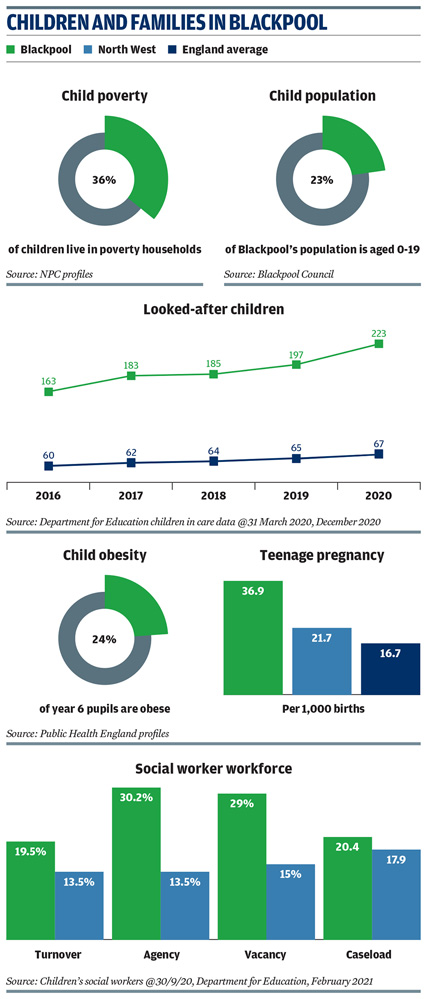
Blackpool is synonymous with the seaside and the council's children's services has spent much of the past two years in rough seas after being rated “inadequate” by Ofsted. However, support from a Department for Education commissioner, development of a new practice model and investment from the council has ensured the department did not founder on the rocks – in March, service leaders were told no further intervention would be required.
Retaining control of children's services has been a huge milestone for the North West council, but there are still many social challenges it faces: the borough has the highest levels of deprivation in England, a transient population due to the seasonal nature of work, and difficulty recruiting experienced staff. The impact of Covid-19 has been deeply felt, both from a health and wellbeing, and economic perspective.
Children's services in Blackpool was given the lowest Ofsted rating in January 2019, with inspectors highlighting “longstanding and widespread failures” in the quality of social work practice.
Following a two-year review of progress, Helen Lincoln, the government-appointed commissioner, recommended that the council be allowed to continue providing children's social care services and there was no need for further intervention on her part or for consideration of an alternative delivery model.
Considerable improvement
In her final report Lincoln said that over the past 18 months Blackpool has put in place the building blocks required to enable “substantial and lasting improvement” for children and families, noting considerable improvement in leadership, practice and partnership arrangements.
She also highlighted a gradual reduction in social worker caseloads as a result of a £4m investment by the council for the recruitment of more than 100 qualified social workers. However, the social work workforce is inexperienced, with more than one third consisting of newly qualified staff in their assessed and supported year of employment.
“There continues to be very significant challenges for Blackpool, not least the very high level of poverty and deprivation in the town and the economic challenge to the council through significant lost revenue this year,” Lincoln said.
“These challenges are evident in continuing high levels of demand on children's services as seen by numbers of referrals, children subject to child protection plans and children in care.
“However, Blackpool is now responding to the needs of its children and families in more restorative and problem-solving ways, with more support from partners and early help to meet children's needs, so that social worker caseloads are slowly reducing giving them more time to work with children and families with complex needs.”
Under its improvement plan, the council also intends to spend £10m on addressing the high numbers of children in care – latest DfE data shows that 223 out of 10,000 children in Blackpool were in care (see graphics).
An Ofsted focused visit in April highlighted that a new model of practice, Blackpool Families Rock, is beginning to influence supervision and reflective practice discussions. Training in relation to this new restorative approach was initially impacted by Covid-19 but has since been rolled out. The focused visit recognised the positive steps taken to improve but said the consistency and quality of work for children on child protection plans was still not good enough.
Responsibility for charting the continued course away from troubled waters sits with assistant director of children's services Jeanette Richards, who joined in 2019 (see box). She supports new DCS Victoria Gent who joined from Lancashire Council in April following the retirement of Diane Booth.

LEADERSHIP VIEW
ROOT-AND-BRANCH RESTRUCTURE BOOSTS FRONTLINE WORK WITH FAMILIES
 By Jeanette Richards, assistant director of children's services, Blackpool Council
By Jeanette Richards, assistant director of children's services, Blackpool Council
I joined Blackpool in 2019, after the Ofsted judgment. There was an acceptance of the findings but shock that it resulted in DfE intervention. The council responded quickly in understanding the need for additional investment and raising the amount of the overall budget spent on children's services.
There was a need for a root-and-branch restructure of teams starting with the front door. We decided to move away from the multi-agency safeguarding hub (Mash) model to one that was more early help and social care focused. A key priority was to intervene at the lowest level and the earliest opportunity, so the idea of a front door that was a safeguarding hub was counterintuitive to that. The Mash sits within the front door, so that it can understand risk in families, but is not “front facing” so not every referral is assessed through a safeguarding perspective. It was important to reclaim social work practice, which is about building relationships and trust with families to enable change.
Behind the front door are assessment and support teams, who undertake work to strengthen families where children are in need or on the child protection register. As part of an enhanced edge-of-care offer, our public law outline teams work with families to try to prevent the need for proceedings as well as securing a permanency plan if needed. As a result, we have grown the number of case holders in all our social work teams and developed a flatter team structure.
The Blackpool Families Rock model of practice was co-produced with carers, families and young people because we believe those who are experts by experience should influence service delivery models. We've worked closely with our partners in practice, Essex, Stockport and Leeds Councils to develop a restorative approach to support families to enable change. We have seen a reduction in entry into care for children aged over five and have hit a 10-year low for over eight-year-olds coming into care, and some of that is down to the success of the model.
However, we support large numbers of children and families and have the highest levels of deprivation in England. The pandemic has had a huge impact: the town normally attracts £1.6bn in revenue from tourists, which shrank to nothing last year and the number of adult benefits claimants has doubled. We are hopeful that more people will come to Blackpool to enjoy the attractions as restrictions ease.
We have enhanced our pay rates and are constantly revising our recruitment strategy. We have reduced agency cover to around 15 per cent, but people are moving jobs less so we knew practitioners in their assessed and supported year in employment would be fundamental to getting levels of staffing and caseloads to where we wanted them. Family issues are complex and to support our team members at the beginning of their career with us, we have invested in additional learning and development opportunities.
We pride ourselves on knowing our areas of strengths and areas for development, which are captured in our improvement plan. Our recent Ofsted focused visit confirmed this. We are aspirational for children, young people and families in Blackpool. Our aim is to be better than “requires improvement” at our next full inspection.

